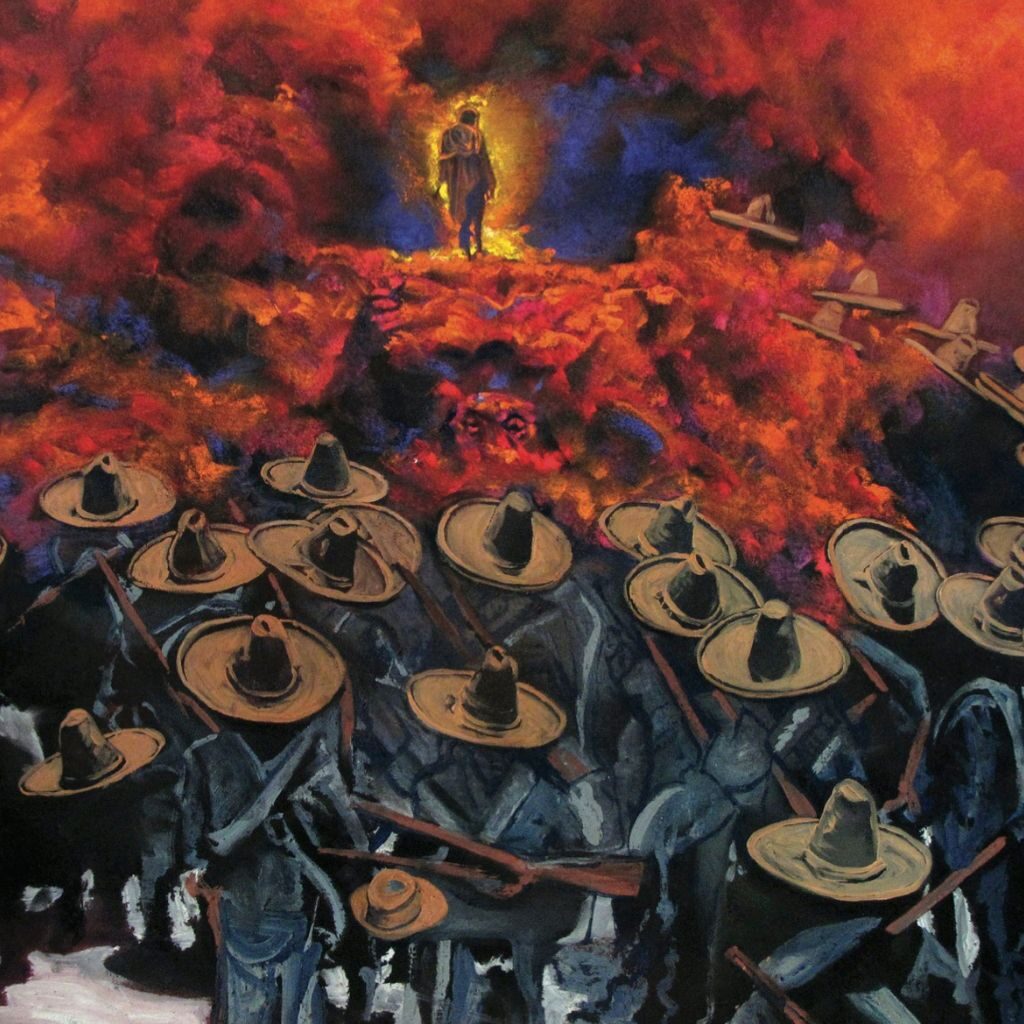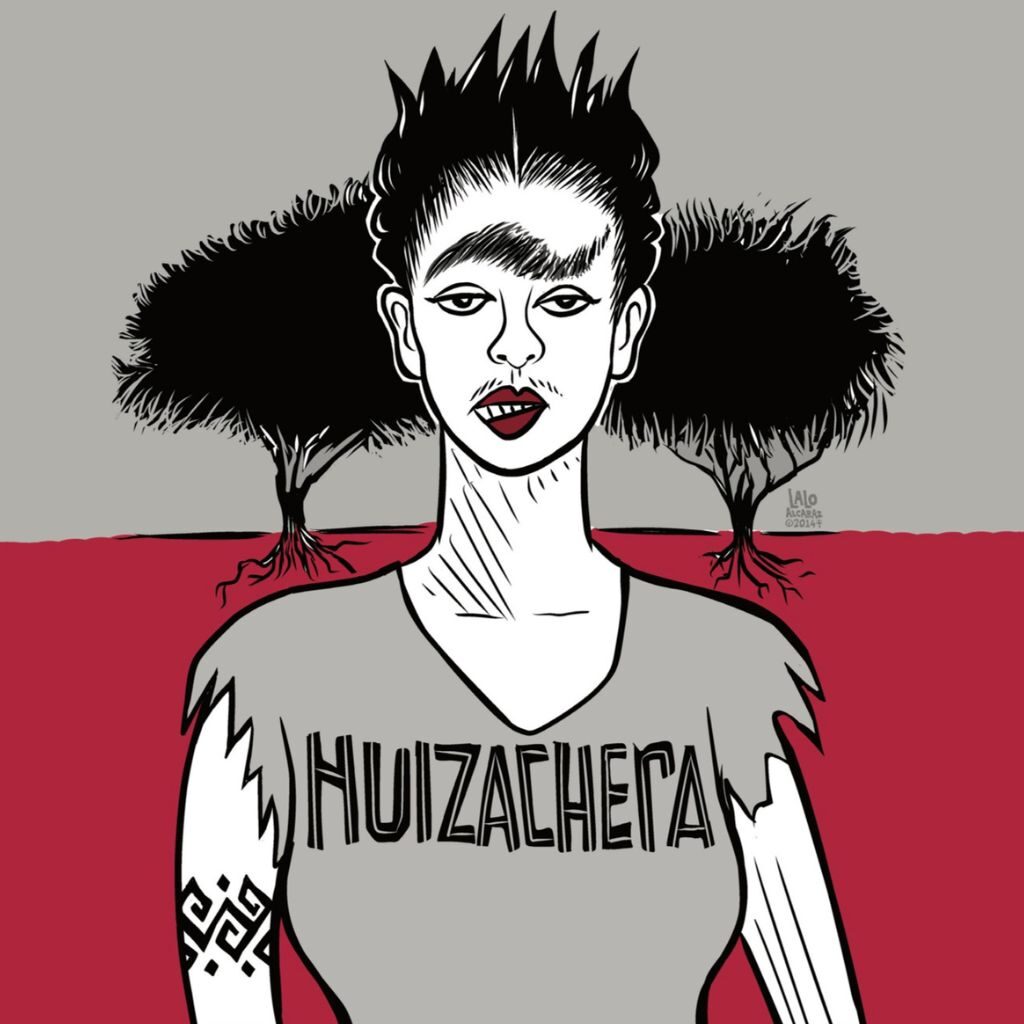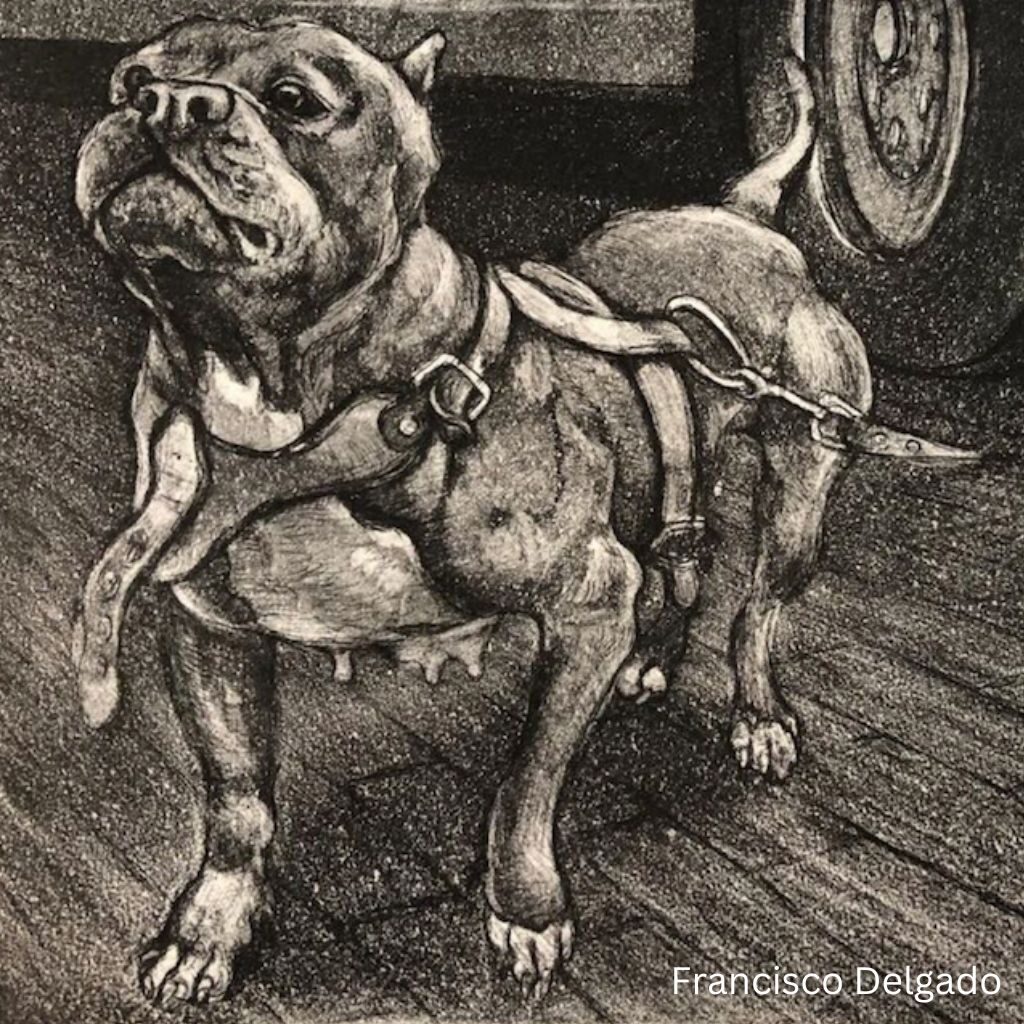READ
Featured
Settler CitizenShip No More
Huizache 11 Special Portfolio
Curated by Alan Pelaez Lopez
June 2024 marks the one hundredth anniversary of the Indian Citizenship Act, which officially assigned U.S. citizenship to Indigenous peoples of the connected forty-eight settler states (Alaska and Hawai’i weren’t yet annexed). I use assigned because not all American Indians wanted U.S. citizenship since it legally foreclosed Indigenous epistemologies of belonging, kinship, and sovereignty. Two weeks after American Indians were assigned citizenship status, the Immigration Act of 1924 was enacted, limiting the number of visas allotted to migrants seeking entry into the U.S., leading to the formation of the entity we now know as “U.S. Border Patrol.” These acts marked a new legal regulation of Indigenous and migrant aliveness.
The curation of poems that follow rejects the notion that U.S. citizenship has ever been a gift. U.S. citizenship is a looming reminder of conquest, but it also begets attention to the quotidian ways in which Indigenous peoples are resisting and imagining alternative ways of living and being outside/in/through/against occupation. In this issue, Huizache celebrates Indigenous refusal, the active practice of rejecting the authority states believe they have over Indigenous kinship and Indigenous aliveness. Spearheaded by the work of Mohawk anthropologist Audra Simpson, we understand refusal as the declaration that Indigenous peoples speak for themselves/ourselves and say: “this is who we are,” and, we know who we are not (Simpson 2007: 73).
Kintsugi
From Huizache 11
Vickie Vértiz
Growing up working-class, my want for cute clothes was never-ending.
My parents are Mexican immigrants who completed the fourth grade and are exceptional at finding things at the best price because they never had a choice.
They also grew up in households with alcoholics: binge drinking as celebration, as a practice of male privilege, pedas to cope with being run out of town, losing your business, or your family’s immigration north–o sea, porque puedo, porque me duele, y porque me da la gana.
In families like mine, families brutalized by colonization, you can pick up some sticky habits. Always looking to fill some void. I pile on the distractions until one day, they feel out of control: interminable scrolling for one chingadera or another, and not even buying, mind you, JUST LOOKING.
*
I may be the most gifted thrifter you know.
If we’re friends, then we’ve played the “guess how much I paid for this?” game, where I reveal how incredibly little I paid for a vintage Burberry trench coat or a cashmere Everlane sweater. Such a talented thrifter, I even found a place where clothes were free.
Before COVID made working-class death a daily, collective reality, I was at thrift shops weekly. I could look at a rack and spot just the treasure I’d always wanted, but it was too expensive at the time, or too risky, like that hot pink, body-conscious dress freestyle singers wore in the 90s.
But thrifting has gone from something I used to do for fun to something that I do now almost constantly: checking my phone apps for updates and looking more and more at the piles of clothes to mend, clean, or put away. And now, all the joy of wearing some cute ass shit is zapped right out of my life. It’s no fun anymore.
Sometimes I wonder if there’s something wrong with my hobby, or me. Does all the time I spend obsessively looking for the lowest price just make my life one long chase scene on an endless loop? Is something broken in me?
*
In Buddhism, desire and ignorance are parallel routes to suffering. “Desire” refers to craving pleasure, material goods, basically whatever you do not have, like all those dresses my family could not buy me as a kid. The concepts also imply that these cravings can never be satisfied. Therefore, desiring these things that cannot bring satisfaction can only bring suffering.
“The problem is not the wanting,” my partner says. “It’s that it doesn’t end.”
No matter how many vintage, ten dollar dresses I own, I always want more.
*
It was 10:00 p.m., 12:00 a.m., and 1:00 a.m. It was Spring 2020, then Summer 2022, then now. I was on my couch, my dog snoozing next to me. I was scrolling endlessly looking for very specific shit. Gold lamé dresses. John Fluevog high heels. Sweaters with hearts on them. Silver leather clogs. For two to three hours a night, I avoided the news where mostly working-class, Black, Indigenous, and People of Color were dying of COVID in numbers so big my chest heaved whenever they showed the miles of funerary boxes being stored in semi-truck freezers. I buried my head in online thrifting. I confessed my fear that it was an addiction to my therapist who said that I should look up Pia Mellody instead.
“We all have addictive behaviors,” said my therapist. “But I don’t think this is an addiction. I think codependency may be closer to what you’re talking about.” Codependency is a condition or relationship where a person “manifesting […] a strong desire for approval has an unhealthy attachment to another, often controlling or manipulative, person […].”
Well, shit. Who do I want approval from? When will they be satisfied?
*
I like to cruise the web, casually driving by items I want, but then when it comes to buying them, I’m not interested anymore. I enjoy visiting things I covet, imagining where I’d wear it, who’d be there. Fantasizing feels amazing: I’m back at the gay club with the sticky floor, dancing in the streets during Pride month, or making out in the parking lot of the Griffith Park Observatory, overlooking the glitter lights below.
*
Let’s take the bus to JCPenney in 1985. Amá peered into the glowing jewelry counters. She sometimes bought gold earrings on layaway, but not from stores like this. She bought them from señoras, or the swap meet or the pawn shop.
Other days, we’d take the bus north to East L.A., dipping in and out of the bustling clothing stores on Whittier Boulevard. Eternal window shoppers.
But if her friend Marta had her VW bus, we’d hit the Paramount Swap Meet, where you could get all kinds of stuff for a dollar: geometric acrylic hair clips, two churros, a bag of beans.
I’m trying to tell you about the maximum pleasure achieved with each dollar.
Is it any wonder my ass finds something I like, then spends hours trying to find the cheapest version because: Value! Joy! Bragging rights!
We were four figures, my brothers, mom, and I strolling down brown streets, gazing through tall glass windows into the middle class. We didn’t have a big house and yard. We shared our five plex with six other families, the 710 Freeway, and a handful of cholos.
But that was our time, and with it, we chose to look.
A LESSON IN HARVESTING OR THE DAY I WAS TOLD MY BODY WAS A BETRAYAL
From Huizache 11
Karla Cordero
late morning in the garden, ache-kneed & sore hips, i show zoey how to harvest, how to pluck carrots from the ground like loose teeth. carrots the color of all good things: mandarins, marigolds, the winged ends of monarchs gliding above sunflowers. she holds their long slender bodies by their leafy updos. ZA-NA-HOR-IA, i say slow in spanish to add more music to her mouth from the motherland. my mother calls with one of her bad-feeling check-ins, then the doctor, with results, with a diagnosis in the form of my body devouring itself because of inheritance. my questions answered with: possibly, could be, all of the above, it’s hard to say. & i say not now. right now, the sun on our skin, my niece & her carrot conquest & below us a plot of soil vacant of leaf & root. i teach zoey how an empty graveyard can be growth again. again we work the soil, sow the seeds, soak the rows. MAN-GUER-A, i say. & together we spray streams of hose water across the yard. pretend we’re two goddamn ghostbusters but instead of seizing phantoms, we free them with laughter. zoey shows me how a good growth life can still come from a place of violence.
Moony Gets Pissed When I Bogart the Joint
From Huizache 11
Sergio Lima
for Sara “Moony” Aguilera
Moony tilts her head
away from the lighter’s flame
toward the sunset.
The joint hangs
languid from her lips
as the sun slides
behind the lavender
cotton of a cloud.
I watch as the ember
brightens and grows
with each puckered puff.
The cherry and the sun:
two neon oranges
dueling above the ocean.
The smaller one floats toward me
across the cab of Moony’s Civic,
pinched between her index and thumb
as Lauryn Hill’s “Nothing Even Matters”
plays on the stereo and battles with gusts
of wind blowing in from the open windows.
Here, fool.
Illusions
From Huizache 11
Leonora Simonovis
I look at the chicken
pecking the yard, know
that, if I wanted to, I
could break her neck
in seconds. I think
of my grandmother
my great grandmother
and all the women
before me who had
to break something
inside of them so others
wouldn’t. Once I sat
in front of a gray wolf,
let our gazes lock, a wolf
whose name I won’t
share because there’s
always a hunter. I could
tell you what I saw
in those eyes made me
afraid, but I’d be lying.
Sometimes, all it takes
is one soul crushing look
to realize how wrong we’ve
been. That a story is just a story.
Foreword
From Huizache 9
Dagoberto Gilb
I came up fighting and surviving. I came up expecting to be good at what I did and wanting to catch up, get better, to be better. To not talk it but do it. Where I was, wasn’t where I wanted to stay.
I started working at thirteen because I needed money to take care of myself. Making my own money was my own power, my own independence. I worked through high school and through undergrad and grad years where I fed my starving brain. Soon a husband and father, I worked in construction for sixteen years, mostly as a high-rise union carpenter. I wrote stories when I could. When I published a book of fiction that won national literary prizes, change dropped on me suddenly. Though the only courses in English I’d ever taken were the required freshman ones at junior colleges, I became a professor in a well-established and high-quality mfa program. As a student, with no family money support, working, I’d focused on surviving and catching up with other students who always seemed to have gotten their skills and knowledge genetically at birth. Now a professor of graduate writing students, I saw how few like me there were. With my new job, I decided I would let a couple of Chicano students, dreaming of becoming writers, audit my mfa workshop. That got me yelled at loudly, the recognizable roar that preceded getting fired at any construction site. I relented by starting what we called the “illegal, undocumented workshop” that met weekly at my Austin apartment, outside the university’s vigilance. (Three of those went on to publish notable books.) In time, more brown students began applying and entering the program. But with system, history, dominant culture milieu and money and mores, I decided to go another route.
My writing career was doing fine (e.g., multiple times in The New Yorker). My life template had changed though. It wasn’t just my own battles and survival anymore. I became we. Do what for others what was never done for me, for you, for us. Build ladders, throw ropes down, and we climb over walls.
I considered moving on to big name universities. Good for me probably, as a play in new academic vita game for writers, but they were even less my world, not much better than what I already had as a job. And probably fewer students from the neighborhoods I knew. Then I interviewed at the University of Houston, Victoria, a school not on anyone’s map—a tiny college with oil endowed literary ambitions at the time, in a region that was first an outpost in New Spain, and then Old Mexico, until it became Texas. South Texas, where UHV was, is what I would still call Chicanolandia. The small undergraduate student body was close to 70% Mexican American, 25% Black. At the interview, when the then president asked me if there had ever been an HBCU type of college campus for Mexican Americans, I decided to push my chips all in.
House of SIlences
From Huizache 10
Elda María Román
When you want to talk to your father but don’t know how, you might end up with more frozen peas than you need. My grocery cart made it look like I was a vegan prepping for the end of the world, unsure of how to assemble a balanced meal, and I hadn’t yet summoned the courage to ask my father the question I needed to ask. Before this trip to the store, it had been a year since we’d spoken. It was 2021 and our silent stand-off started when I sided with my mother. When I was home the summer before, she’d been livid as she vented to me each night about his unwillingness to communicate. The final straw, she said, was him throwing a pillow at her while she was snoring. He’ll miss me when I’m dead, she said tearfully. It scared me that she would will herself dead to hurt him back.
The silence scared me, but in a different way than it used to. I thought of the TV show Vida, and the episode in which two Mexican American siblings mourn their father’s death. The brother breaks into sobs as he tells his sister he realizes he never knew his father, but also that his father didn’t know him. Recalling this episode, I sensed I was preemptively mourning the loss of both my parents. The current silence felt like a placeholder for more to come.
After this revelation, it still took me months to work up the courage to approach my father. I wanted to ask him about his life, but I didn’t know what he would say, and I still prime myself to be rejected by him. I didn’t want the proverbial pillow thrown at my head.
When I was home during that summer, I started small. Out of the house, there was no place for us to hide, no rooms to wall ourselves into, so I asked him if he would go to the grocery store with me.
I was nervous when he said yes.
Palmas últimas / Kasayeo’s Washintonia Filifera
From Huizache 10
Anna Flores
It’s said the desert’s last true palm self-shears,
dropping dead fronds by way of storm. The trees
are glaciation descendants. Know an
ocean’s true name. Know when desert arrived.
Leaf-less and blood welded, my body is
a knowing I cannot fall away from.
Words are my strange molting. I’m pronouncing
my city’s name, its tail curling. Its heart
in the ground. Language is sacred waste. It’s
eaten through short roots. I’m only my mouth’s
storyteller. I tell it of wildfires
two states over. Their archive, in my lung.
Ambahan: Araw ng mga Patay (Día de los Muertos)
From Huizache 10
Barbara Jane Reyes
I am giving you this smoke
rolled tobacco, flowered herbs
tanglad and clean fire, I burn
sandalwood incense, I burn
crackling pine branches, I burn
verses carved on bamboo stalks
verses from dreams and full moons
candles that smell like roses
handfuls of soil, I bring you
bayabas, mangga for you
ampalaya from the vine
sayote, fresh fragrant green
flores de kalabasa
sampaguita from the vine
pinecones, smooth stones I bring you



